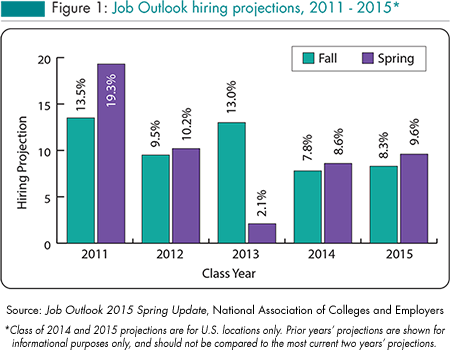The Class Of 2015's Job Prospects Are Looking Pretty Good

By:
The National Association of Colleges and Employers (NACE) just released its 2015 jobs outlook that reveals a 9.6 percent projected hiring increase for spring graduates. Last spring, employers said they planned to hire 8.6 percent more new graduates than the previoius year, so if this continues, the future could hold fewer unemployed recent graduates.
That said, job prospects were better for the class of 2011, which had a 19.3 percent spring graduate hiring projection, and the class of 2012, which saw a 10.2 percent spring graduate hiring projection. From 2011-2015, spring 2013 graduates obtained their degrees during the most discouraging time, as there was only a 2.1 percent projected increase in hiring for this group of people. 2014 saw an improvement, and 2015 shows promise as well:
 NACE - naceweb.org
NACE - naceweb.org
Why it matters when you graduate college.
The recession of 2007-2009 proved to be especially difficult for Millennials, many of whom obtained their degrees with crippling student loans and horrendous job prospects due to the recession. Though the economy has since become more stabilized, the students who graduated during the recession or shortly thereafter have a higher chance of receiving low wages throughout their careers, according to research by Yale School of Management economist Lisa Kahn in 2009. Workers face a 2.5 percent loss in wages even 15 years after finishing school, and those who begin working during difficult economic times have a lower chance of scoring big promotions and similar career milestones, according to Kahn's findings.
"This is suggestive that workers who graduate in bad economies are unable to fully shift into better jobs after the economy picks up," Kahn wrote in 2009.
Kathryn Edwards, an Economic Policy Institute researcher, told The Washington Times that graduates have fewer options in bad economies and are less likely to lobby for bigger paychecks. "It used to be common that graduates had multiple offers in place, and that's not happening now," Edwards said. "So they won't be able to negotiate for higher wages. And it makes economic sense that if you start lower, you're more likely to end lower."
The upside of graduating during less prosperous times.
Graduating when the economy is in trouble has a surprising benefit. In 2013, research from Emory University revealed that graduating during a recession might make you happier in your career. "[E]ntering the working world during a recession may pose enough adversity to promote positive subjective evaluations, but not so much that it permanently discolors their outlook on work," wrote study author Emily C. Bianchi.
Bianchi's findings suggest that graduating during a recession builds just enough character to make new workers come out as stronger people. "The difficult and often demoralizing conditions of their early working lives seemed to shape positively how they thought about and evaluated later work environments," Bianchi wrote. "This is consistent with recent research in psychology which shows that some lifetime adversity is associated with greater happiness than either too much or too little. Too much adversity can be emotionally debilitating. Too little can weaken resilience, allowing people to magnify and exaggerate the bumps of everyday life."
Whether you're graduating now while employers are on the lookout for talented new workers or during a more turbulent economic period later on down that road, rest assured knowing you'll have at least one thing going in your favor.
